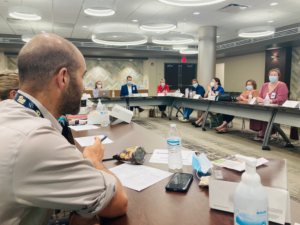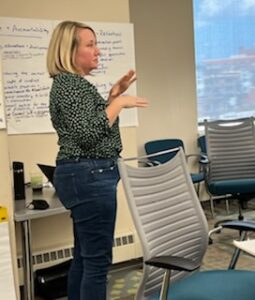Four Areas of Practical Bioethics
Edited remarks by James Stowe, PhD, President and CEO of the Center, at our 40th Anniversary Celebration Dinner on April 11, 2024.

I am so honored to be in a leadership position at the Center. I grew up in Manhattan, Kansas, and had the opportunity to encounter the Center’s work while a graduate student in Gerontology at K-State. Now, having lived in the Kansas City region for a number of years with my wife, Becky, and our two kids, Parker and Sadie, I am more convinced than ever of the importance of the Center’s work, even to each member of my family – as we age, make healthcare decisions, and as we encounter and grapple with new technologies in health and healthcare.
Of course, the very heart of the Center is people. The Center staff are experts – it is a joy to work with such intelligent and skilled people. Our staff, under guidance and support from our Board of Directors, have emphasized four areas of practical bioethics.

In Ethics Services, you’ll find Center bioethicists educating and interacting with students and other learners, helping healthcare organizations with training and policy development, and interacting with providers, patients and families at the bedside or in clinical settings. This work seeks to amplify the work of ethics committees, ethics champions, and others at our partner organizations who seek to choose the correct path forward in care or major healthcare decisions.
Several years ago, the Center launched the Ethical AI Initiative to raise and respond to the issue of AI-enabled tools in healthcare. Through the help of an advisory council, we are now moving that work to implementation – the result will be key guidance for the ethical use of these tools from selection of a product to ongoing monitoring of its use.
In all areas of the Center’s work, we seek to provide strong value to our partners and collaborators. That means a business case and strong rationale behind what we do and how it backs the services that we offer. This is key to establishing an enduring impact.
We are also elevating Health Justice through refined methods for eliciting community voice to speak to public health questions and quandaries – our work in this area is in a research and development phase, and we are excited to test our ideas and prove their value and impact.

Many of you know the Center’s long history in Advance Care Planning – essential for expressing your wishes for serious illness or end-of-life care. We have been learning about how to ally with underserved communities, their leadership, and the service organizations that they trust. Through cultural humility, we hope to better facilitate and support access to Advance Care Planning resources. We hope to soon be able to announce a significant new effort in this area of work – stay tuned for more.
With these major areas of focus in mind, we also remain poised and ready, as always, to respond practically to new questions and challenges that emerge. We strive for real impact in all that we do.








